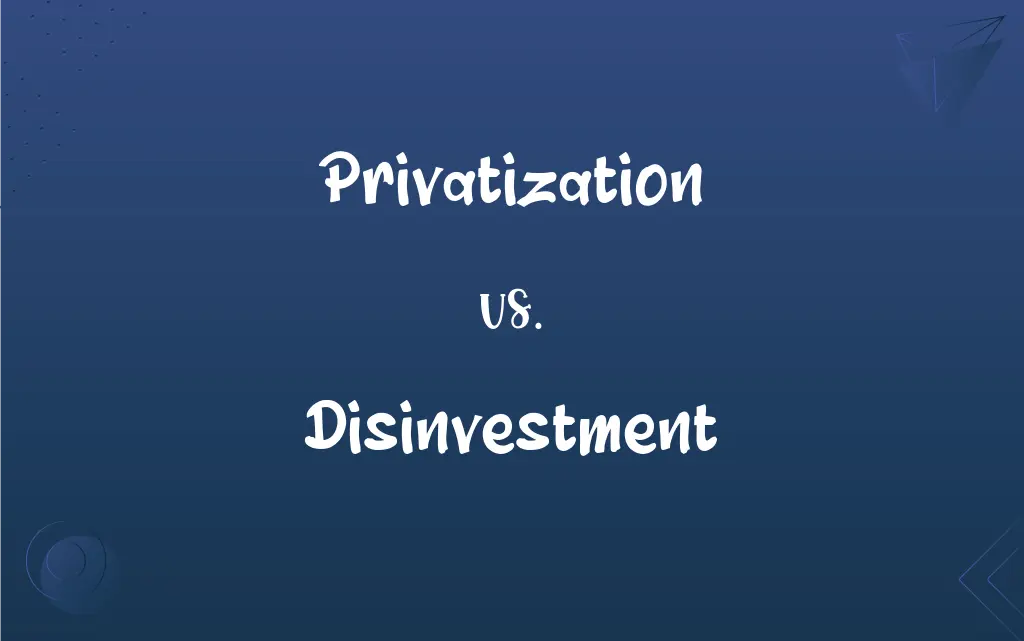Privatization vs. Disinvestment: What's the Difference?
Edited by Aimie Carlson || By Harlon Moss || Published on February 21, 2024
Privatization is the transfer of business, property, or services from public to private ownership and control, while disinvestment involves a government selling or liquidating its stake in a public enterprise.

Key Differences
Privatization entails transferring public sector entities to private ownership and management, aiming to improve efficiency and productivity. Disinvestment, however, refers to the process where the government reduces its stake in a public company, partially or completely selling its shares.
The goal of privatization is often to introduce market competition and private sector efficiencies into former public sectors. In contrast, disinvestment is primarily a fiscal strategy used by governments to reduce their holdings in companies to raise capital or cut fiscal burdens.
Privatization can result in a complete change in ownership and control, leading to significant operational and managerial transformations. Disinvestment, however, may still leave the entity in the public sector, with the government retaining a minority stake.
In privatization, the private entity assumes full responsibility for the business, including risks and profits. Disinvestment, on the other hand, might involve selling only a part of the government's stake, possibly without relinquishing total control or responsibility.
Privatization can lead to a complete overhaul in the way an organization is run, focusing on profit maximization. Disinvestment may be part of a broader strategic plan, such as reducing fiscal deficits or redirecting government focus, without fundamentally altering the company’s mission or operations.
ADVERTISEMENT
Comparison Chart
Definition
Transfer of public enterprises to private ownership.
Government selling its stake in a public enterprise.
Ownership Change
Full change to private ownership.
Partial or full reduction of government ownership.
Purpose
Improve efficiency, introduce market competition.
Raise capital, reduce fiscal burden.
Control and Responsibility
Full control shifts to private sector.
Government may retain some control.
Impact on Operations
Complete operational and managerial overhaul.
May not fundamentally alter operations.
ADVERTISEMENT
Privatization and Disinvestment Definitions
Privatization
Privatization refers to the government selling state-owned enterprises to private investors.
The government's privatization agenda included selling off several public utilities.
Disinvestment
Disinvestment is the action of an organization or government selling or liquidating an asset or subsidiary.
The government's disinvestment in the steel industry marked a significant policy shift.
Privatization
In economic terms, privatization means the shift of public services to private control and ownership.
Privatization of the postal service was met with both support and criticism.
Disinvestment
Disinvestment can mean the government selling its shares in a state-owned enterprise.
The disinvestment process was initiated to attract more private sector investment.
Privatization
Privatization is the process of transferring public sector entities to the private sector.
The privatization of the railway system led to improved services and technology.
Disinvestment
Disinvestment involves a strategy to divest from certain sectors or businesses.
The disinvestment in public broadcasting was intended to encourage private investment.
Privatization
Privatization involves converting a public entity into a privately owned and operated organization.
The city's water treatment plant underwent privatization last year.
Disinvestment
Disinvestment refers to the process of a government reducing its stake in a public sector enterprise.
Disinvestment in the national airline helped reduce the fiscal deficit.
Privatization
Privatization is the act of reducing government control in business sectors.
The privatization of airports was intended to boost efficiency and customer service.
Disinvestment
In financial terms, disinvestment is the withdrawal or reduction of capital investment in a business or project.
The disinvestment from the rural development project was due to budgetary constraints.
Privatization
To change (an industry or business, for example) from governmental or public ownership or control to private enterprise
"Egypt has to some degree privatized agriculture, allowing farmers to sell directly to consumers instead of through the government" (Marq de Villiers).
Disinvestment
Withdrawal of capital investment from a company or country.
Privatization
The transfer of a company or organization from government to private ownership and control.
Disinvestment
The process of disinvesting; negative investment.
Disinvestment
The withdrawal of capital from a country or corporation
FAQs
What is privatization?
Privatization is transferring public services or businesses to private ownership and control.
Why do governments privatize companies?
Governments privatize to introduce efficiency, reduce fiscal burden, and encourage competition.
Does privatization mean complete ownership change?
Yes, privatization typically means complete transfer to private hands.
What does disinvestment mean?
Disinvestment is the process of a government selling its stake in a public sector enterprise.
What is the goal of disinvestment?
The goal of disinvestment is to raise capital, reduce deficits, or restructure the economy.
Can disinvestment lead to privatization?
Disinvestment can lead to privatization if the government sells its majority stake.
What are the benefits of privatization?
Benefits include improved efficiency, better services, and innovation.
What are the risks of disinvestment?
Risks include loss of public accountability and potential job losses.
What is strategic disinvestment?
Strategic disinvestment is when the government sells a significant or controlling stake in a company.
How does privatization affect employees?
Privatization can lead to changes in employment terms, often aiming for higher efficiency.
Does disinvestment always reduce government control?
Not always; the government may retain some control even after disinvestment.
Is disinvestment a quick process?
Disinvestment can be a complex and time-consuming process, depending on the size of the stake.
Who benefits from privatization?
Consumers, investors, and sometimes employees benefit from privatization.
Why do governments opt for disinvestment?
Governments opt for disinvestment for financial, strategic, or political reasons.
Can privatization improve service quality?
It can, as private entities often focus on efficiency and customer service.
What sectors are commonly disinvested?
Common sectors include manufacturing, airlines, and telecommunications.
Does privatization affect prices?
Privatization can affect prices, potentially leading to higher costs for better services.
Can privatization lead to monopoly?
There's a risk of monopoly, especially if the market lacks competition.
Is privatization reversible?
Reversing privatization is challenging and rare, often involving complex legal processes.
Can disinvestment be partial?
Yes, disinvestment can be partial, with the government selling only part of its stake.
About Author
Written by
Harlon MossHarlon is a seasoned quality moderator and accomplished content writer for Difference Wiki. An alumnus of the prestigious University of California, he earned his degree in Computer Science. Leveraging his academic background, Harlon brings a meticulous and informed perspective to his work, ensuring content accuracy and excellence.
Edited by
Aimie CarlsonAimie Carlson, holding a master's degree in English literature, is a fervent English language enthusiast. She lends her writing talents to Difference Wiki, a prominent website that specializes in comparisons, offering readers insightful analyses that both captivate and inform.







































































